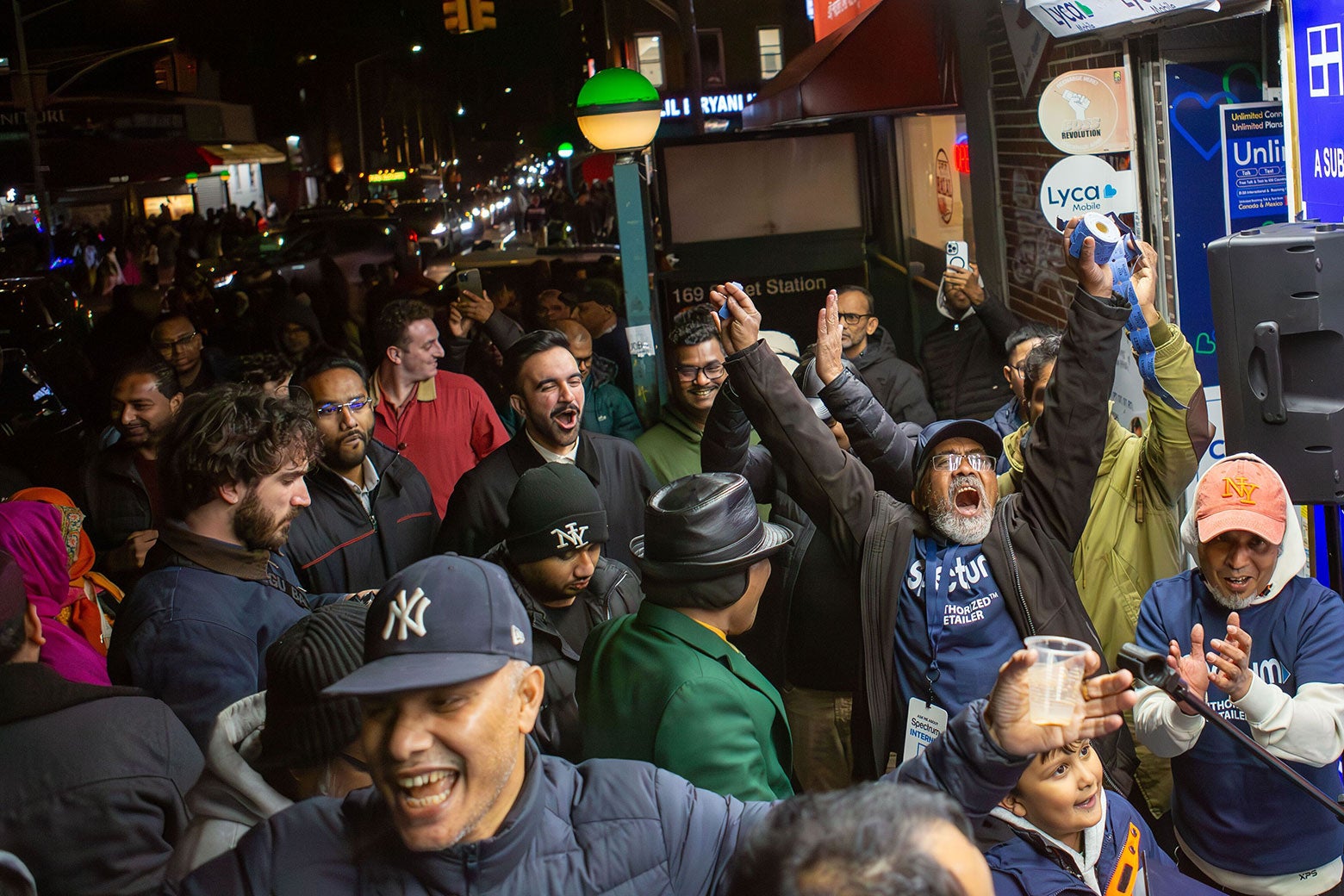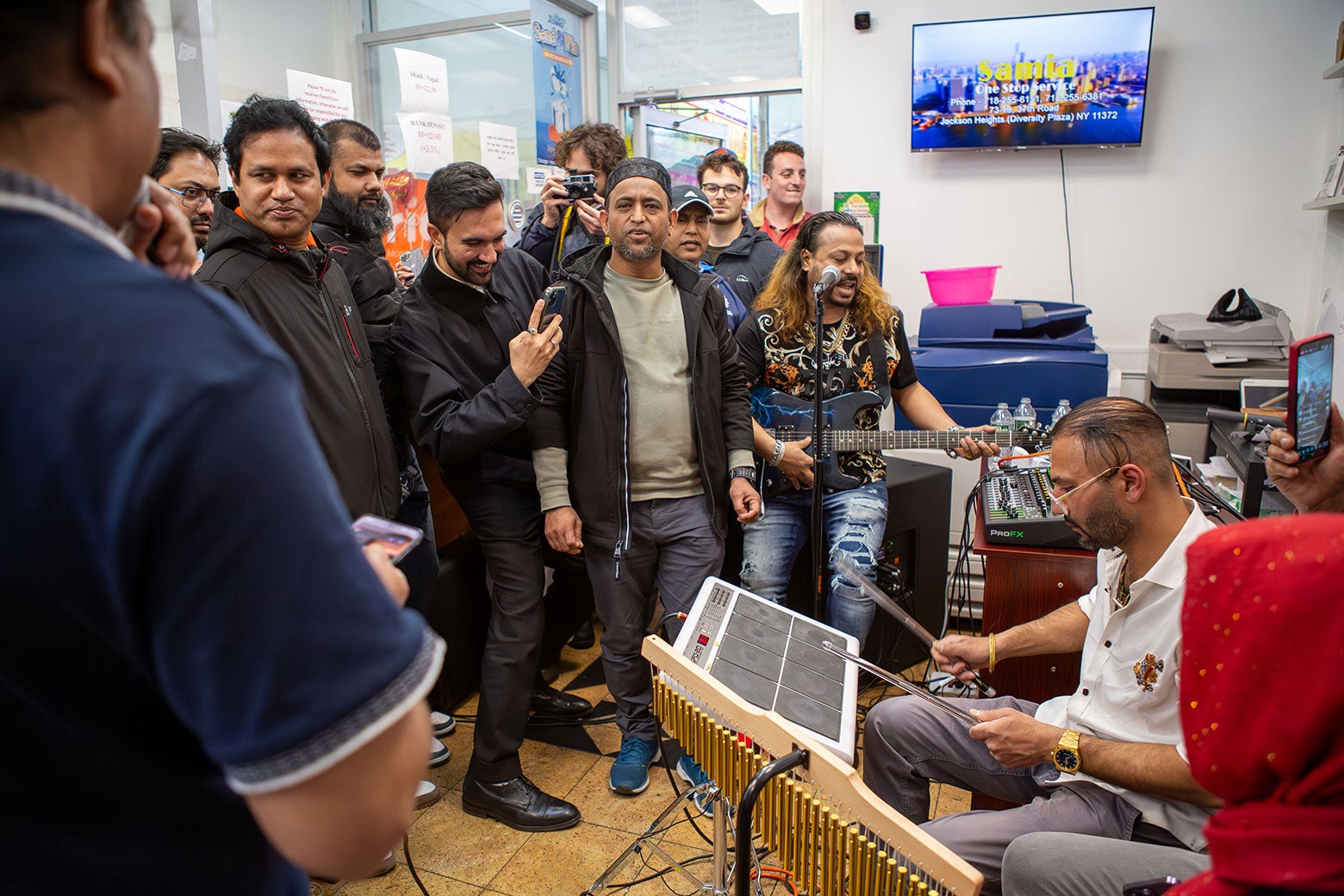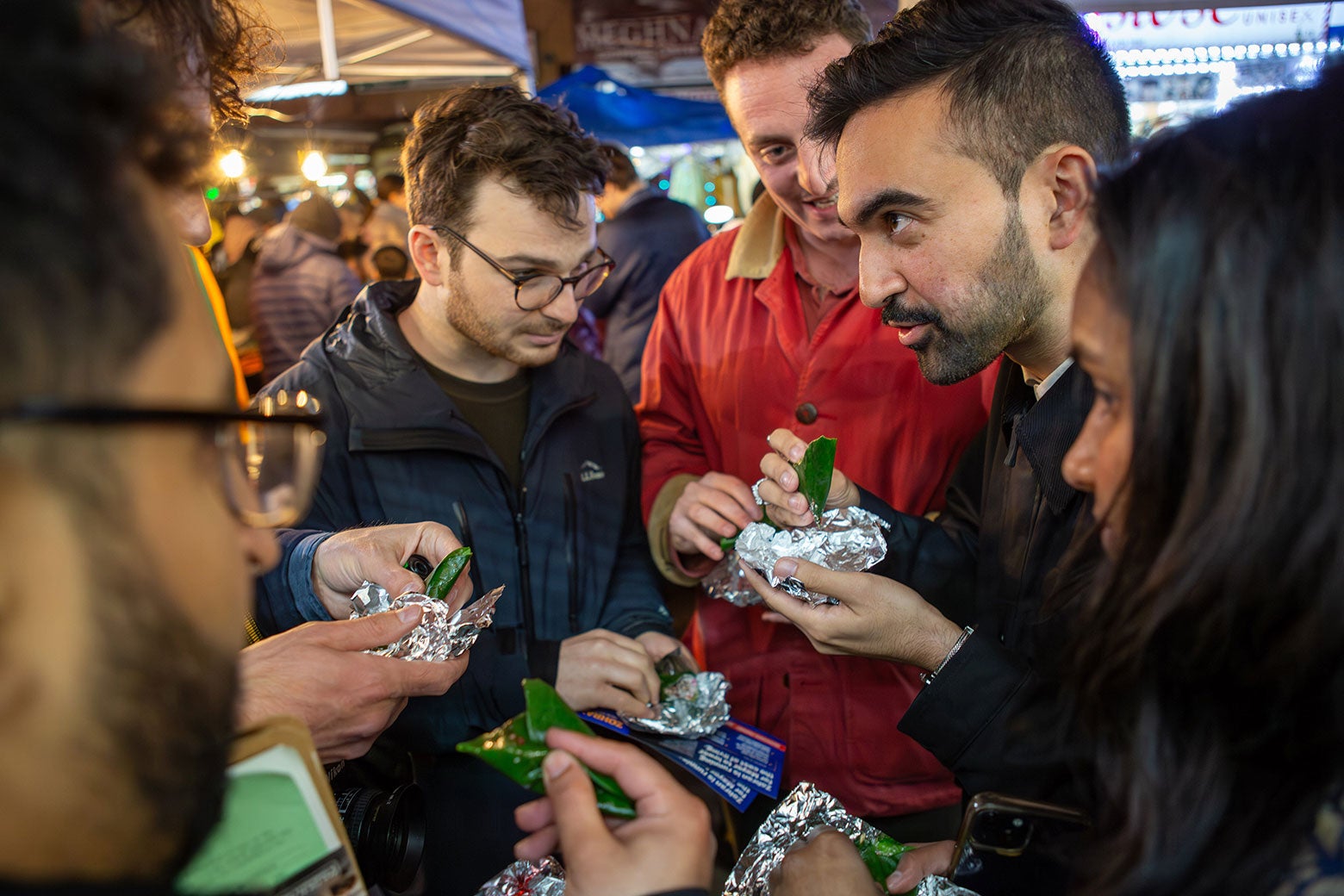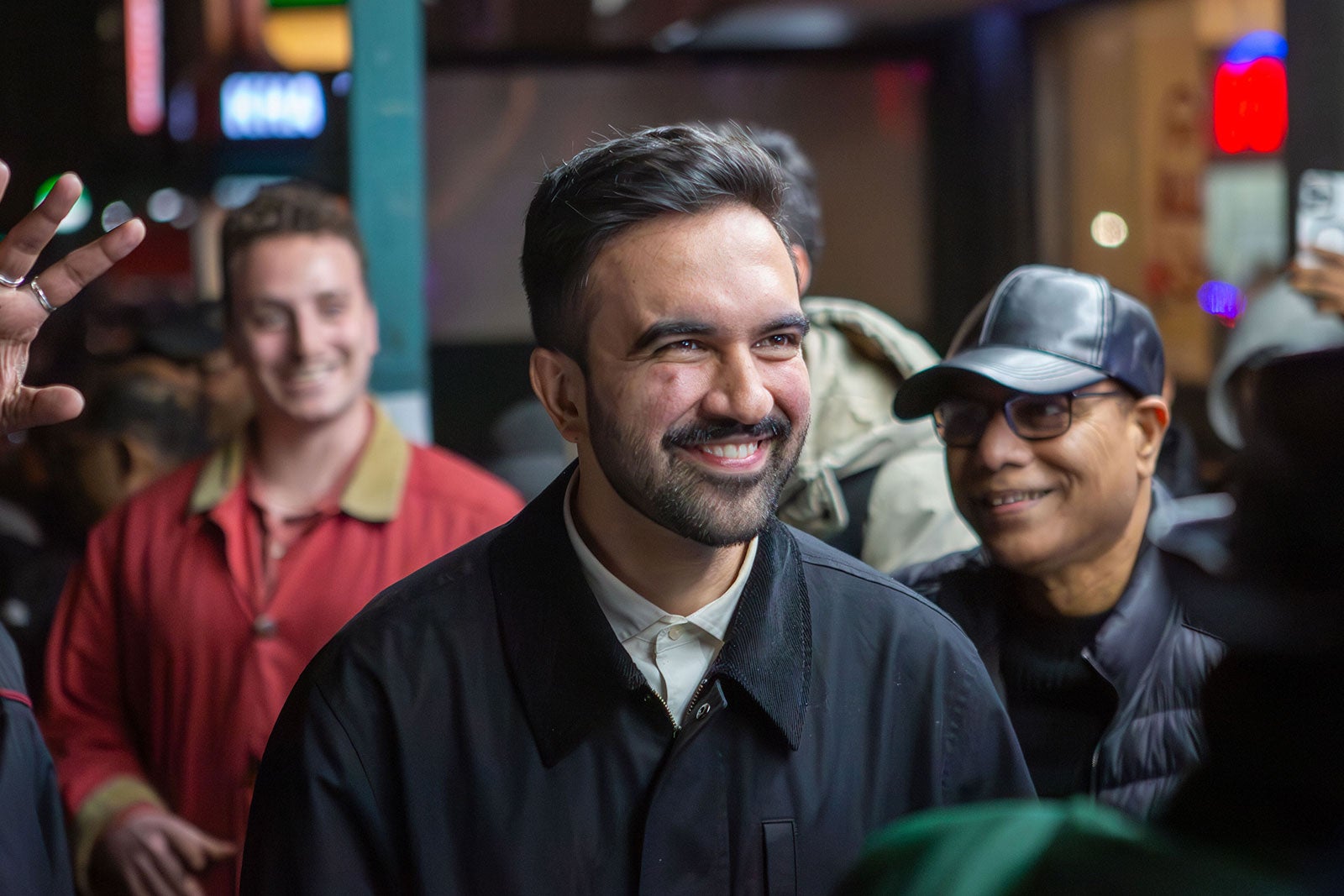Sign up for the Slatest to get the most insightful analysis, criticism, and advice out there, delivered to your inbox daily.
The final sunset of Ramadan last week found me below a mosque in the Bronx, in a basement cafeteria, elbow to elbow with hungry Muslims awaiting that last fast-breaking meal of the year. It was the first stop on Zohran Mamdani’s nightlong mayoral campaign blitz into the robust Muslim constituency that dots New York City.
At 33, Mamdani looks less like a politician than like someone’s cool older cousin. He held the mic loosely, like a tall can of Arizona Iced Tea. He had, in his typical beaming fashion, been charming and catching voters off guard all night. But here he turned serious. “In this city and in this country, many people feel like they can say whatever they want about a Muslim in public life, that they can call any of us a terrorist,” he said. “On this June 24th, we have an opportunity to say that Muslims don’t just belong in New York City. We belong in City Hall.”
This is what Mamdani does, in a nutshell: He disarms his audience with easy charm and infectious energy, and just as easily dives into the most vexing issues facing them with both force and a smile.
It seems to be working. Mamdani is suddenly everywhere. A recent surge of glowing profiles and features have underlined the New York state assemblyman’s unlikely No. 2 position in polls for mayor, behind only Andrew Cuomo, the disgraced former governor who leads the race. They tend to point to his acumen online, especially on TikTok—this kind of video is a prime example—and his ambidextrous appeal to different voters despite his unapologetic democratic socialist politics. His fundraising, driven by small donors, has topped $8 million. He is the rare Democrat who is meeting the most stark and uncertain moment in the party’s recent history with a message that’s both urgent and, against all odds, upbeat.
Post-meal, we hopped in a car—though I’m told that Zohran prefers the subway—and hurried to Parkchester for our first stop for Chaand Raat, the massive South Asian Eid street festival. Light-up toys flashed in every kid’s hands and fireworks exploded overhead while henna artists inked swirling patterns onto excited patrons.
I stopped to take in the atmosphere—an enormous display of Muslim pride, from the extra-large neon “Eid Mubarak” sign to a troop of young girls reciting Quran verses on a huge stage in the intersection. When I looked up again, Mamdani had already melted into the carnival ahead of me, going row by row, shaking every hand he could. A teenager screamed, “Oh my God! It’s the guy from TikTok!” Suddenly, Mamdani was posing for endless selfies like a celebrity.
“I’m excited. And caffeinated,” he told me, smiling. The previous weeks of campaigning through Ramadan fasting had left him depleted, he said; he’d passed out asleep on his couch in his suit a few nights ago. But tonight, he was fully alive. He recited his core campaign promises effortlessly: “Freeze the rent. Make buses fast and free. Deliver universal child care.” “I say it so much that voters can finish the sentence,” he said.

Soon, he ended up on the large stage yelling “Eid Mubarak!” to a cheering crowd, where he proudly proclaimed himself to be the first elected Muslim official to run for mayor. A host took the mic afterward, improvising an endorsement to loud applause: “If we just stick together, all the rights we always complain about—we have to fight for our rights. Inshallah, we will support him.”
None of this was planned. From there, the night only ramped up.
Our next stop, Jamaica, Queens, was louder, wilder, and much more packed. Music blared from huge speakers where older men belted out Bollywood karaoke. Mamdani jumped right in, clapping wildly, mouthing the words, and then grabbed the mic: “Remember to vote June 24th!” The crowd roared.
Mamdani thrives here, in this joyful chaos. “I’ve been coming to Chaand Raat for years,” he said, sweating slightly. “Our dream has always been to break out of the world of New York City politics and into the world of New York City. We may be the first mayoral campaign that has ever campaigned at Chaand Raat! And that is the dream—to watch uncles sing songs and then take a moment to give the mic over where we can talk about Election Day and then go back to the songs, because that’s what life in New York City is. Life is busy. Life is so many things all at the same time.”
I continued to struggle to keep up as he ducked into random storefronts to introduce himself. Wherever there was a microphone, Mamdani grabbed it and urged people to vote. He kept disappearing into the street party as he danced his way up and down the block.

Along the way, Mamdani listened intently as a frustrated uncle vented about the city denying their permit to close the street. “Look around, it’s crazy out here,” the man gestured, pointing at a city bus inching its way carefully through the bustling, jam-packed street. Mamdani nodded emphatically, echoing, “Unacceptable.” He leaned toward me and added, “Muslim voters want the same thing every community wants—respect and equality.”
In that moment, Mamdani zagged the way he often does, turning serious and channeling righteous anger. He knows intimately the origins of Muslim New Yorkers’ distrust of the government: After 9/11, the New York Police Department rolled out a sprawling surveillance operation targeting mosques, college campuses, students, halal spots, and even neighborhood barbershops. Hundreds of Muslims were hauled to jail without charges, some put in solitary confinement for months. The crackdown never turned up any terrorism leads, but it permanently soured relationships between Muslims and law enforcement just as hate crimes surged. “I’ve seen firsthand the impacts,” Mamdani said. “I went to high school with New Yorkers who were entrapped.”
Mamdani sees dark echoes in what’s happening now with Mahmoud Khalil, a Palestinian former Columbia University student and activist who is currently imprisoned awaiting trial despite never being accused of crime. Mamdani protested the arrest by shouting down Tom Homan, the U.S. Immigration and Customs Enforcement acting director, at the New York Capitol in Albany. “I would never have sent the NYPD onto Columbia’s campus,” Mamdani said. “That led to a police officer discharging their weapon. It was the least safe that those students have been.”
Mamdani’s unwavering stance might make an easy target for his rivals when the race heats up. While his solidarity with protesters has drawn cheers from many progressive voters, it has also earned bitter accusations of antisemitism. In a political landscape where that kind of controversy usually spells trouble, Mamdani’s willingness to stand his ground might be his riskiest gamble. Indeed, as his profile continued to rise, the New York Post ran a cover story on Wednesday titled “DANGEROUS MAM: NYers must stop the anti-Israel forces trying to elect radical Zohran Mamdani as mayor.”
Unbothered, Mamdani insisted this stance carries a potential for unifying Democratic voters. “We talk about freedom, justice, safety for everyone, but suddenly we draw lines about who ‘everyone’ is,” he said. I asked if he is ready to accept that this stance might end up splashed across attack ads. He shrugged it off. “I’m proud I’ve always stood for consistency and universal human rights. And plenty of New Yorkers feel the same.”
By the time we got to Jackson Heights, the energy was dizzying. More fireworks popped overhead and music blasted from every alley. College kids draped in keffiyehs recognized Mamdani and yelled, “Say ‘Free Palestine!’ ” He cheerfully obliged. “One state or two?” shouted another. “Equal rights for all,” he answered. The teens burst into laughter, gently ribbing him for his diplomatic answer, and Mamdani smiled back warmly, completely unphased.
At one point, he discovered a travel agency storefront blasting live music, slipped inside, and grabbed yet another microphone: “Vote June 24th!” Before leaving, he spotted a paan vendor selling betel leaves loaded with sweet and spicy fillings. “This’ll get us through the night,” he said, handing them out to his laughing staff. Standing in a circle, they ate in sync. One of them nearly gagged. “Tastes like incense,” the staffer said. Mamdani laughed uncontrollably.

By 11 p.m., I was spent. Fasting had taken a lot out of me, too. But Mamdani looked ready to go until dawn. I asked him the question that inevitably comes up in any profile, no matter how glowing: “Can you really win?”
“We’re nowhere near our ceiling,” he said. “I’m very excited to keep building this campaign until we win this race, and to show New Yorkers they don’t have to choose between the past of a disgraced former governor or the present of a disgraced current mayor. They can choose the future, and that’s what our campaign represents.”
Mamdani’s position in the polls has been impressive. But after the rolling disaster of Eric Adams’ mayoralty and Donald Trump’s bruising attacks on the city, voters seem drawn to a familiar executive like Andrew Cuomo, despite the sexual harassment and COVID nursing home scandals that drove him from the state’s top office. All night, New Yorkers seemed curious about Mamdani but some, particularly ones who’ve never voted before, remain skeptical about veering into politics at all.
One man stopped me as Mamdani bounced ahead into another crowd. “He’s the only one out here meeting people like this,” he said. Would he vote for Zohran? The man shrugged. “If the right candidate comes along, I’ll consider it,” he said with a hint of sarcasm. Who would that be? He smiled. “I’ll know when I feel it.”
By then, Mamdani was already gone, clapping, laughing, dancing deeper into the Queens Eid night, fueled with joy and the belief that politics could, at least tonight, be genuinely fun. He seemed sure that voters would follow him.

